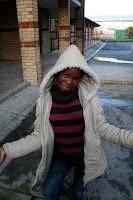
All expense paid trip to Cape Town, South Africa? How could I possibly turn down that offer? When I first learned about the project I saw it as a great opportunity, not only to become exposed to new types of work, but also to gain the credentials of putting the UN on my resume. An all expense paid trip to South Africa was an added bonus. As the days progressed closer and closer to the trip, all I could feel was excitement, for going to such a different place.
When we finally arrived in Cape Town, all that excitement was channeled into something else. When we first walked through Langa, I could not control the emotional stir that was occurring deep inside me. I didn’t know whether to feel sad, guilty, depressed, uneasy or fortunate. The first full day we were in Langa, and had the opportunity to watch some children perform a gumboot dance. After their performance we chatted and took photos with them. I could not believe how talented they were. After a few minutes of timid pondering, I finally asked the children if they could do the thunderstance pose for a picture. One child followed my lead, and the others followed him shortly thereafter. I was immediately overcome with a strong connective feeling of joy. To me the thunderstance is just a silly thing I started doing, but after that it meant so much more than that to me. It became a feeling of empowerment and cultural bonding. From this point forward I knew it was already going to be a life changing trip.
As the week flew by, I had the chance to meet with more children in townships and help tutor some kids after school. I had some great conversations with some very bright children. We taught each other about our cultures and shared different cultural practices. Another very moving experience for me was when the children of Langa came up to us and stated holding our hands, playing with us, and giving us hugs. This showed me how open and accepting they are. This gave me a whole new perspective on life. I now feel like I want to be more open and accepting of everyone. It reminds me of the expression, “live life with arms wide open.” There is such a strong sense of community and togetherness that it makes me envious of what they have, even though it is not big houses, lots of clothes, or trendy electronics. A common perception of many in South Africa is that we as Americans are rich, however, they greatly surpass us in being spiritually rich, with such a strong communal bond.
In the few days right before South Africa, I had a weird feeling overcome me, knowing that it would probably be a life changing experience. Now as I sit here, a few weeks after returning from South Africa, I realize how much of a life changing experience it really turned out to be. After seeing such extreme poverty, as well as such extreme happiness, I have a much strong appreciation for everything I have. I have also come to the realization that life is too precious to find fault with others. While I may never walk the streets of Langa again, with the hand of a child resting in mine, that picture will always be in my head. I will never forget my trip to South Africa, and all that it has helped show me who I am as a person.

 Occasionally when asked about this game project, we’re confronted by the seemingly reasonable question “Why address violence against women, in a developing economy? Aren’t there more important issues to work on in such a place, like poverty, or health, or education?” It’s hard at first to understand why improving quality of life for just one portion of the population is getting attention and funding, when some people are struggling just to stay alive at all. In fact, one of the key motivations behind our project’s theme is the unexpected causality: gender-based violence, in all its forms, is hugely responsible for the world's continuing cycles of poverty.
Occasionally when asked about this game project, we’re confronted by the seemingly reasonable question “Why address violence against women, in a developing economy? Aren’t there more important issues to work on in such a place, like poverty, or health, or education?” It’s hard at first to understand why improving quality of life for just one portion of the population is getting attention and funding, when some people are struggling just to stay alive at all. In fact, one of the key motivations behind our project’s theme is the unexpected causality: gender-based violence, in all its forms, is hugely responsible for the world's continuing cycles of poverty.

























































